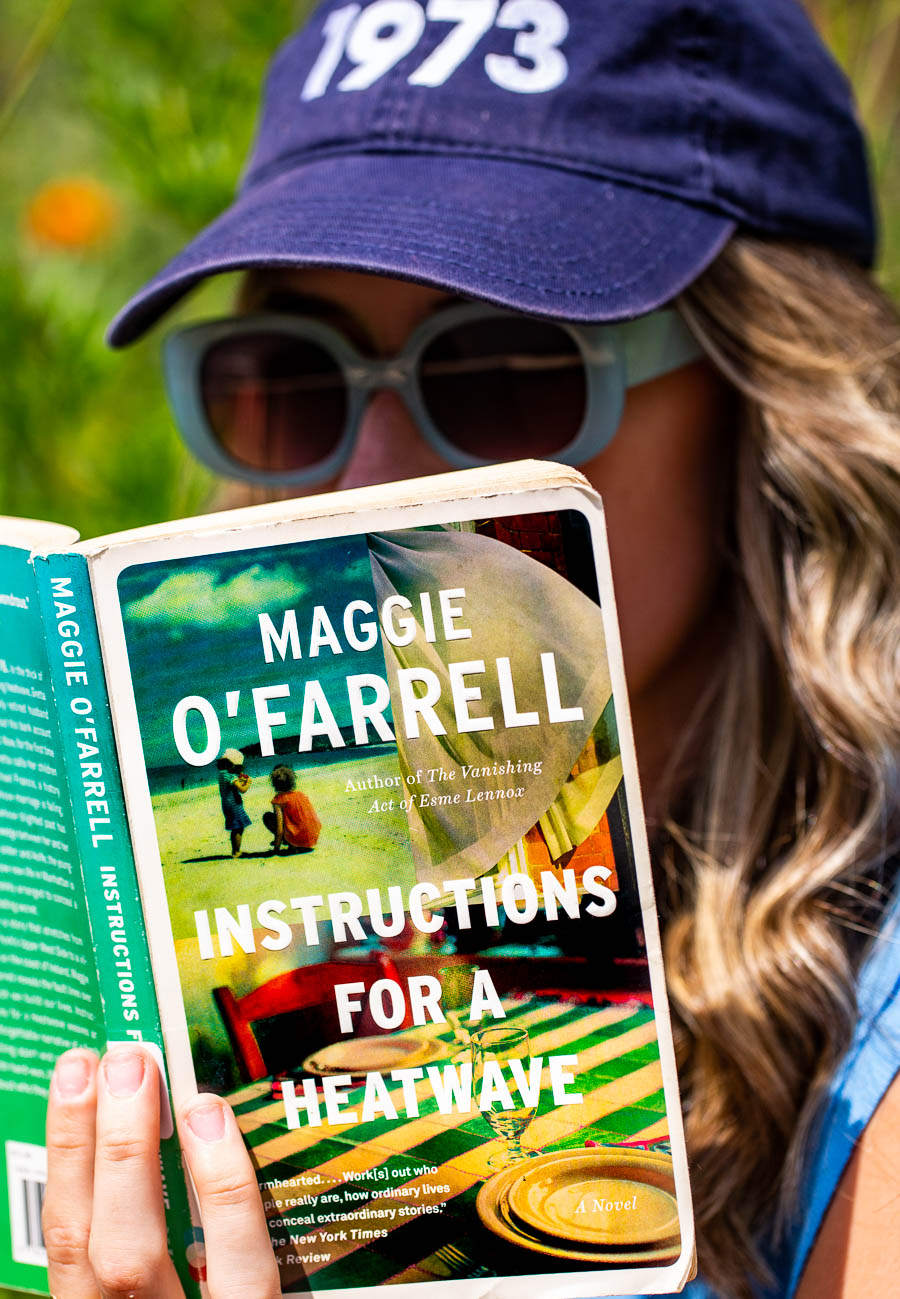Instructions for a Heatwave Maggie O’Farrell A family drama set against the infamous British heatwave of 1976. Robert Riordan, recently retired, husband to Gretta, gets up from the breakfast table one morning, leaves the house to buy a newspaper and doesn’t return. Gretta, the Irish matriarch of this family that has settled in London, calls her kids who then return home—including Aoife, the youngest, who hasn’t been seen in several years and currently lives in New York. From here we learn the backstories of each sibling and how they interact with each other. Michael Francis, a history teacher who put aside Ph.D aspirations for his family, now has a failing marriage. Monica too has marriage problems with her much older husband and two step-daughters who aren’t crazy about her. Aoife has undiagnosed dyslexia and is functionally illiterate—a fact that she frantically tries to hide from the world, with terrible results. It’s an age old family drama of secrets, half truths and misunderstandings which, with the passage of time, generates tangled and torn family dynamics. Written with all the lovely warmth and humanity about people and the daily struggles of ordinary life that Maggie O’Farrell is so good at.
Small Wars Sadie Jones Hal Treherne, a Major in the British Army is dispatched to Cyprus in 1956 to help ferret out terrorists seeking to unite the island with Greece. Thrilled to be seeing some action after years of peaceful service, it doesn’t take long before it becomes apparent that Hal is not terribly well equipped to deal with the brutality of war and its moral underpinnings. As a result his once solid marriage to Claire, who has accompanied him to Cyprus with their two young daughters, starts to fray at the edges. The stifling atmosphere of the period, the island, and the political situation are beautifully evoked in richly detailed and elegant prose, but where Jones’ writing really sings is in its slow motion unfolding of disastrous events. A quiet, understated story of duty and integrity and a soldier in combat, at war with himself.
The Heatwave Kate Riordan Sylvie Durand receives a letter which necessitates a trip back to the family home in the South of France. It’s 1993 and a sweltering heatwave is sweeping through the area, creating fires across the countryside. She has brought along her 14 year old daughter Emma, but on arriving at the house it is thoughts of her fraught relationship with her oldest daughter Elodie which preoccupy her. With a slow burning, languid ease, the details of Elodie’s birth and childhood and the complicated relationship she shares with her mother unwind. There are no gotcha moments, no sudden pivots just the steady unfurling of family secrets leading to an outcome which is more unexpected revelation than plot twist. The book does an excellent job of creating a deliciously creepy atmosphere heavy with heat and oppressive with underlying tension from start to finish — and mothers everywhere will find it impossible not to connect with Sylvie’s inner turmoil over her child.
A Month In The Country J.L. Carr Tom Birken, a shell shocked veteran of the Great War and abandoned by his wife, arrives in the remote Yorkshire Village of Oxgodby in order to restore a medieval mural which has been recently discovered on a wall of the village’s church. Over the course of a few weeks, after painstakingly stripping away years of whitewash and grime, he reveals a masterpiece which has been shrouded in secrecy for hundreds of years. Beguiled by the languid, hazy warmth of summertime, he falls in step with the rhythms of country life and its people and finds himself, once again, opening up to the beauty of life. And yet he proceeds to make a fleeting decision which he seemingly regrets for the rest of his days. Because the book is narrated by Tom as an old man looking back on these few idyllic months, the story is imbued with a bittersweet melancholy which permeates throughout. A poignant and elegantly crafted look at the healing power of nature and art and an exquisite ode to the beauty of a perfect English summer.
Bitter Orange Claire Fuller After the death of her overbearing mother, Frances, pushing forty, yet to be kissed and without a friend in the world, is hired to go to Lynton’s, a crumbling English manor house now owned by an absentee American. Her job is to catalogue the architecture of the garden. When she arrives she finds that she has company in the form of the handsome Peter, who has been hired to catalogue the inside of the house, and his beautiful, mysterious, Italian speaking wife, Cara. Cara befriends Frances, inviting her to join her and Peter for dinner and over the course of a few weeks, while languishing in each others company during frequent bouts of heavy eating and drinking and most definitely not working, the story of Peter and Cara’s relationship unfurls alongside Frances’ own. It’s an odd little ménage à trois that they form and it ripples uneasily with lust and envy, heightened by the lurid glare of a bright sun and punctuated with several exquisitely mortifying moments which make you squirm. Restraint crumbles and tension shimmers in a book which manages to be dark and bright all at the same time.
The Go-Between L.P. Hartley A quintessentially British novel of a bygone era with its country house setting and people who spend days partaking of tea on the lawn. Set during the Edwardian era, this is the story of twelve year old Leo who comes from a working class background but attends a wealthy boarding school. One fateful summer Leo is invited to Brandham Hall in Norfolk by his friend Marcus. Upon arrival he meets Marcus’ older sister, the beautiful Marian, and he is instantly smitten. Taking full advantage of this, Marian gets Leo to take letters back and forth between her and a local tenant farmer, Ted, with whom she’s having a clandestine relationship, despite her upcoming engagement to the local Viscount. The two lovers, over the course of a few days, emotionally manipulate the innocent Leo with disastrous consequences. This is a British classic, taught in schools everywhere and begins with the famous opening line “the past is a foreign country; they do things differently there.” Reading it as an adult, it is so much easier to appreciate its subtleties and quiet devastation.
The Narrowboat Summer Anne Youngson A chance meeting on a towpath between three women leads to recently fired Eve and recently separated Sally offering to take Anastasia’s narrow boat to Chester when she must have an operation. Navigating the canals becomes metaphor for navigating their new and unpredictable futures. There’s nothing particularly deep or fancy about this tale of friendship and second chances, but it has an endearing cast of characters — dog included — a couple of little plot twists (if one could call them that) and a long and meandering journey through the English countryside during summer — and the inner workings of the narrowboat community provides an utterly charming backdrop.
The Enchanted April Elizabeth von Arnim In 1920’s London, during a cold, grey February, an ad in the paper for a medieval Italian castle available for rent during the month of April brings together four women from very different walks of life. Lottie, open and warm-hearted is slowly being stifled by her boorish and miserly husband. Rose, buttoned up and dutifully religious is appalled at the way her husband makes a living — writing salacious books of which God must surely not approve. Mrs Fisher, judgmental and tirelessly old-fashioned lives permanently sequestered in the past while Lady Caroline is bored with her own beauty and the tiresome flatteries of men which accompanies it. On arriving at the castle the four women initially bristle at each other’s foibles but the beauty of their surroundings, the warmth of the sun, and Lottie’s endless positive energy cause the women to open up not just to each other but to themselves. Amidst the fig trees and plum blossoms, with the sweet fragrance of wisteria and Daphne heavy in the air, love, in all its variations, pushes all else aside to take center stage.
A Room With A View E.M. Forster When Lucy Honeychurch and her chaperone Aunt Charlotte check into their Italian hotel, they are disappointed to learn that their rooms do not have the view they were promised. But working-class Mr. Emerson and his free-spirited son George, come to their rescue and offer up their own rooms, which do. Later, venturing out on to the Italian streets alone, Lucy witnesses a gruesome street fight and is swiftly caught by George when she faints which is soon followed by a stolen kiss in the golden glow of afternoon sunshine. But alas, Lucy returns home to the English countryside and becomes engaged to the pretentious and snobby Cecil. But when she crosses paths with George once again, Lucy’s feelings become decidedly muddled: does she stick with convention and Cecil or throw of the shackles of propriety and head off into a glorious summer sunset with George. With its subtle humour and irony, A Room with a View is a gentle breeze of a book with a light and airy feel. Indeed its beautiful settings, delightful characters and the cheekiest of vicars conspire to make this perhaps the summeriest of books set in summer.

